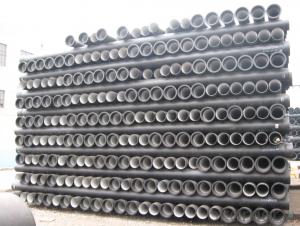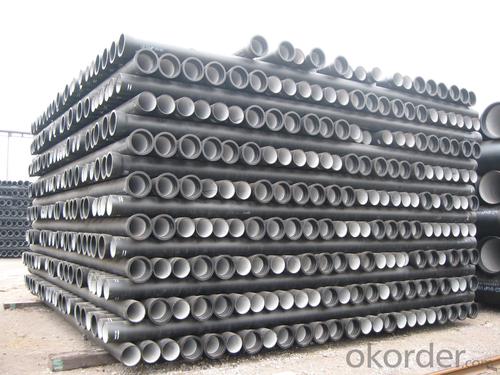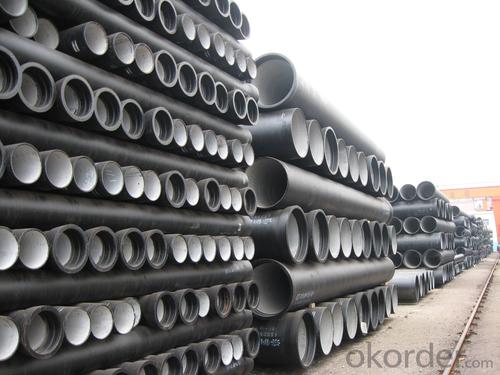Ductile Iron Pipe DN450
OKorder Service Pledge
Quality Product, Order Online Tracking, Timely Delivery
OKorder Financial Service
Credit Rating, Credit Services, Credit Purchasing
You Might Also Like
Specifications
Quick Details
| Place of Origin: | China (Mainland) | Brand Name: | CMAX | Model Number: | T type / K type / Flange type |
| Length: | 6m / 5.7m / Negotiable | Standard: | ISO2531 / EN545 / EN598 | Application: | Potable / Sewage water |
| Diameter: | DN80~DN2200 | Shape: | Round | Hardness: | 230 |
| Pipe Wall Thickness: | standard | Pull Strength: | 420 | Yield (≥ MPa): | 300 |
| Material: | Ductile Iron | Type: | Centrifugal ductile cast iron pipe | Certification: | ISO2531 / EN545 / EN598 |
| Outer Diameter: | 80-2200 | Thickness: | standard | Specification: | DN80~DN2200 |
| |
The advantages to the customer:
Trustworthy financial strength.
One-stop shopping.
Fast and efficient service.
Coordination of shipments from multiple plants.
Specialists of the overseas shipping process.
A more competitive price.
- Q: How are ductile iron pipes installed?
- Ductile iron pipes are typically installed using a variety of methods, including trenching or open-cut excavation, horizontal directional drilling, and pipe bursting. In the traditional trenching method, a trench is dug to the required depth and slope, and the pipe is then lowered into place and joined using mechanical or push-on joints. Horizontal directional drilling involves drilling a pilot hole and then pulling the pipe through it, while pipe bursting involves breaking the existing pipe and replacing it with a new ductile iron pipe.
- Q: How do ductile iron pipes compare to PVC pipes in terms of strength?
- Ductile iron pipes are generally stronger than PVC pipes in terms of their ability to withstand external loads and pressure. Ductile iron has a higher tensile strength and can handle higher operating pressures, making it suitable for a wider range of applications, including underground and high-pressure systems. PVC pipes, on the other hand, have lower tensile strength and are more prone to cracking or bursting under high pressure or when exposed to extreme temperatures. However, PVC pipes are lighter and easier to handle, making them more convenient for installation and maintenance in certain situations.
- Q: Can ductile iron pipes be used for underground storage of hazardous materials?
- It is not recommended to use ductile iron pipes for underground storage of hazardous materials. Ductile iron pipes are typically utilized for water and sewage systems because of their durability and resistance to corrosion. However, they are not designed to withstand the specific demands and potential dangers associated with storing hazardous materials underground. In the case of underground storage of hazardous materials, it is crucial to utilize materials that are specially engineered to handle the chemical properties and potential risks linked to these substances. Materials such as high-density polyethylene (HDPE) or fiberglass reinforced plastic (FRP) are commonly employed for underground storage tanks due to their excellent chemical resistance and ability to maintain structural integrity over time. Employing ductile iron pipes for such purposes may result in corrosion, leaks, or even catastrophic failures, which could lead to environmental contamination and potential harm to the surrounding areas. Therefore, it is essential to seek advice from experts and comply with relevant regulations and guidelines when selecting materials for underground storage of hazardous materials to ensure safety and prevent potential hazards.
- Q: How are ductile iron pipes different from PVC pipes?
- Ductile iron pipes are made from a type of iron that has a higher strength and durability compared to PVC pipes, which are made from a type of plastic. Ductile iron pipes are more suitable for high-pressure and underground applications due to their superior strength, while PVC pipes are commonly used for low-pressure and aboveground applications. Additionally, ductile iron pipes have a longer lifespan and can withstand higher temperatures, making them more suitable for a wide range of environments.
- Q: What is the expected bending stress capacity of ductile iron pipes?
- The expected bending stress capacity of ductile iron pipes varies depending on the specific grade and size of the pipe, as well as factors such as installation conditions and external loads. However, ductile iron pipes generally have high strength and flexibility, allowing them to withstand significant bending stresses. It is recommended to refer to the manufacturer's specifications and engineering guidelines for a more accurate estimation of the bending stress capacity of a particular ductile iron pipe.
- Q: Are ductile iron pipes resistant to chemicals?
- Yes, ductile iron pipes are generally resistant to chemicals. Ductile iron is a type of cast iron that has been alloyed with small amounts of magnesium to improve its strength and ductility. This alloying process enhances its resistance to corrosion and chemical attack. Ductile iron pipes have been widely used in various applications including water supply, wastewater treatment, and industrial piping systems where they may come into contact with a variety of chemicals. However, it is important to note that the resistance of ductile iron pipes to chemicals can vary depending on the specific type and concentration of the chemical involved. Therefore, it is advisable to consult the manufacturer or a qualified engineer to determine if ductile iron pipes are suitable for a particular chemical application.
- Q: What is the difference between ductile iron and cast iron pipes?
- The main difference between ductile iron and cast iron pipes lies in their composition and properties. Ductile iron pipes are made from an alloy of iron, carbon, and silicon, which makes them more flexible and resistant to cracking. On the other hand, cast iron pipes are made from a mixture of iron, carbon, and other elements, which provides them with a higher resistance to corrosion and pressure. In summary, ductile iron pipes are more flexible and durable, while cast iron pipes are more resistant to corrosion and pressure.
- Q: Are ductile iron pipes suitable for gravity flow applications?
- Yes, ductile iron pipes are suitable for gravity flow applications. Ductile iron pipes have high strength and durability, making them ideal for carrying fluids under gravity. They can withstand the pressure and weight of fluid flow without the need for additional support or reinforcement. Additionally, ductile iron pipes have excellent corrosion resistance, which ensures their long-term performance in gravity flow systems.
- Q: How are ductile iron pipes protected from external damage?
- Ductile iron pipes are protected from external damage through the application of protective coatings. These coatings act as a barrier, shielding the pipes from corrosion and other forms of external damage. Additionally, the pipes may be encased in concrete or installed in a casing pipe to provide further protection against external forces and impacts.
- Q: Do ductile iron pipes have inner enamel?
- For fire water and living water supply, low requirement is lined with cement mortar, some high can be lined with epoxy resin, epoxy ceramic lining, as well as cement mortar lining epoxy sealing layer (compromise is the price of blame).
Send your message to us
Ductile Iron Pipe DN450
OKorder Service Pledge
Quality Product, Order Online Tracking, Timely Delivery
OKorder Financial Service
Credit Rating, Credit Services, Credit Purchasing
Similar products
Hot products
Hot Searches
Related keywords

























